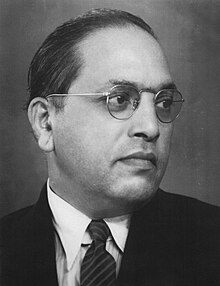Buddhist Society of India
| Formation | 4 May 1955 |
|---|---|
| Founder | B. R. Ambedkar |
| Legal status | Active |
| Purpose | Spread of Buddhism |
| Headquarters | Dadar East, 17/A, Gautam Nagar at Mumbai, in Maharashtra, India |
Area served | India |
Official language | Marathi, Hindi, English |
President | Rajratna Ambedkar |
Main organ | Buddhist Society of India |
| Affiliations | World Fellowship of Buddhists |
| Website | https://tbsoi.org.in/ |
The Buddhist Society of India, known as the Bharatiya Bauddha Mahasabha, is a national Buddhist organization in the Republic of India. It was founded by B. R. Ambedkar on 4 May 1955 in Mumbai, Maharashtra, India. Ambedkar was the drafting chairman of the Indian Constitution, polymath, human rights activist and Buddhism revivalist in India. He was first national President of the organization. At a ceremony held on 8 May 1955 in Nare Park, Bombay (now Mumbai), Ambedkar formally announced the establishment of this organization for the spread of Buddhism in India.[3][4] Its headquarter is in Mumbai. Currently Rajratna Ambedkar, the Great Grandson of B. R. Ambedkar, is the National President of the Buddhist Society of India.
History
[edit]
B. R. Ambedkar studied Buddhism all his life. Around 1950, he devoted his attention to Buddhism and travelled to Ceylon (now Sri Lanka) to attend a meeting of the World Fellowship of Buddhists.[5] While dedicating a new Buddhist vihara near Pune, Ambedkar announced he was writing a book on Buddhism, and that when it was finished, he would formally convert to Buddhism.[6] He twice visited Burma (now Myanmar) in 1954; the second time to attend the third conference of the World Fellowship of Buddhists in Rangoon.[7] In July 1951 he formed the "Bharatiya Bauddha Janasangh" (Indian Buddhist People's Organisation), which became the "Bharatiya Bauddha Mahasabha" or the "Buddhist Society of India" in May 1955.[8][9]
See also
[edit]References
[edit]- ^ "डॉ. भीमराव आंबेडकर के पौत्र ने केंद्र सरकार पर साधा निशाना, कहा 2019 चुनाव में देंगे करारा जवाब".
- ^ Kulkarni, Dhaval (1 November 2022). "Delhi mass religious conversion: BR Ambedkar's kin to protest against 'proscribing' vows". Hindustan Times.
- ^ "The Buddhist Society of India". www.thebuddhistsocietyofindia.in. Retrieved 28 November 2018.
- ^ Rao, Kurukundi Raghavendra; Goswami, Mamani Rayachama; Goswāmī, Māmaṇi Raẏachama; Goswami, Indira; Goswami, Mamani Raisam (1993). Babasaheb Ambedkar. Sahitya Akademi. ISBN 9788172011529.
- ^ Sangharakshita (2006). "Milestone on the Road to conversion". Ambedkar and Buddhism (1st South Asian ed.). New Delhi: Motilal Banarsidass Publishers. p. 72. ISBN 978-8120830233. Retrieved 17 July 2013.
- ^ Pritchett, Frances. "In the 1950s" (PHP). Archived from the original on 20 June 2006. Retrieved 2 August 2006.
- ^ Ganguly, Debjani; Docker, John, eds. (2007). Rethinking Gandhi and Nonviolent Relationality: Global Perspectives. Routledge studies in the modern history of Asia. Vol. 46. London: Routledge. p. 257. ISBN 978-0415437400. OCLC 123912708.
- ^ Omvedt, Gail (17 April 2017). Ambedkar: Towards An Enlightened India. Random House Publishers India Pvt. Limited. ISBN 9789351180883 – via Google Books.
- ^ Quack, Johannes (2011). Disenchanting India: Organized Rationalism and Criticism of Religion in India. Oxford University Press. p. 88. ISBN 978-0199812608. OCLC 704120510.
